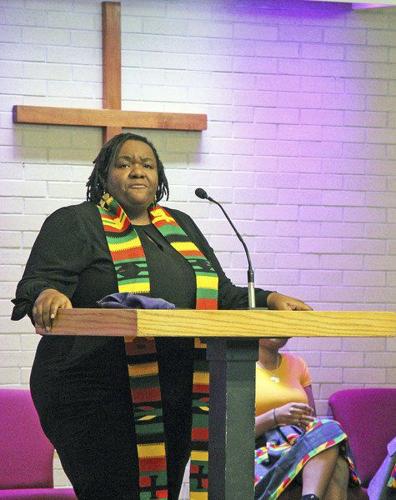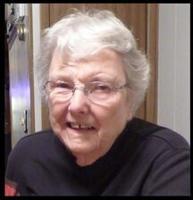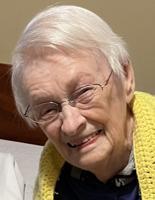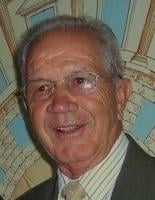GOSHEN — “Nonviolence chooses love, not hate … If you can’t be nice, or you can’t not hate, just leave people alone,” LaKendra Hardware told a full house at Goshen College.
Hardware shared her interpretation of how to uphold Martin Luther King Jr.’s legacy of equality and peace in the modern era on Monday during the school’s service on the federal holiday that honors the slain civil rights leader.
Hardware, who serves as associate director of student life for diversity, equity and inclusion at the college, led the annual convocation at the College Mennonite Church, Chapel. Almost no seat went unfilled.
The approximately one-hour long presentation wove King’s history and ideals into a challenge for the audience. Hardware described King’s start as a young pastor primed to take a stand against a system of racism and injustice against blacks in the South, to his role as a leader and figurehead in the Civil Rights movement, to his assassination in Memphis in April 1968.
“King said, ‘When we work to remedy one evil, we affect all evils,’” Hardware said as she addressed King’s “Triple Evils” in society —racism, poverty and militarism — and his six “Principles of Nonviolence.”
Hardware urged the crowd to carry King’s ideals forward on personal levels to be the best people they can be in order to lift up others around them.
“When I do my best, it enables someone other than me to do better,” she said.
Clinton Stroble, a Goshen College senior, also challenged attendees to not grow complacent in their communities and surround themselves with people of similar characteristics and beliefs. He said people should be willing to engage in conversations on difficult issues, talk it out, in order to reach compromises instead of letting differences stagnate in silence.
“Our silence is dangerous. Silence is the residue of fear,” said Stroble, who majors in peace, justice and conflict studies.
Many audience members took Hardware’s challenge to heart. They thought about how they could apply her message at being their best after the convocation.
“Sometimes it’s just the little things that can make your life change and it can make other people’s lives change,” said Taylor Roasa, a Goshen College sophomore from Oak Park, Michigan, believing each day should start with the question of how to be a better person. “We want to be in this world, like a nice community, a powerful community where we all view each other equally.”
“I think (Hardware) appropriately put it right back to where it needs to go: It needs to start with me,” said Kent Beck of Goshen. “I need to love rather than hate and put myself in situations that help make others better.”
Though inspired by the event, Beck also reflected on a somber theme in the undercurrent about why some advocates for peace like King become martyrs to their cause.
Hardware talked during the convocation of making multiple visits to the Lorraine Hotel in Memphis where King was killed and of touring the National Civil Rights Museum at the site. She described exploring the preserved ghosts of the segregation era, those artifacts of a past where signs bearing “Whites Only” were a way of life, that pushed people like King to seek revolution.
“I’m always impacted, fresh, every time,” Hardware said of visiting the museum.
Terra Kincy, a Goshen College sophomore and Memphis native, said the city still feels the effects from the aftermath of King’s assassination.
“Memphis to this day has not been able to recover from the loss of Dr. King,” Kincy said.
She told the audience about how she went back to the city during winter break and interviewed relatives who lived through the violence that engulfed Memphis, as well as dozens of cities nationwide.
Riots led to fires throughout the city.
“To quote my grandfather, ‘Memphis was mad,’” Kincy said. “Memphis literally went up in flames.”
Kincy concluded her speech by asking why change must come through lethal sacrifice, and then expressed hope for a day when harmony can be achieved without the cost of a hero’s life.
KING VISITED GOSHEN
Goshen College holds a place in King's history as he spoke at the school in March 1960, discussing civil rights and his use of nonviolent tactics to achieve political change.
Nina Longenecker-Fox, a Goshen College alum, appreciated hearing speakers with local connections this year.
“I thought it was a very moving and informative event,” Longnecker-Fox said after the convocation. “It was a little bit more internal, and I thought it really gave voice to our own community members.”
Uriel Macias of Ligonier was inspired to think deeper about taking a more active role in living through King’s ideals.
“We should be getting out there and trying to be leaders for our community, for our race, and just trying to spread the word out,” said Macias, a Goshen College sophomore. “Make sure everybody knows about what’s going on, and not to just treat this as a holiday where everybody can get like a school day off, but actually take time to learn about it and see the back-story of everything.”
Aimee Ambrose can be reached at aimee.ambrose@goshennews.com or 574-533-2151, ext. 316.












